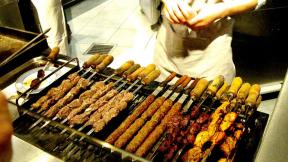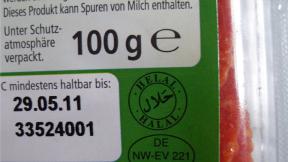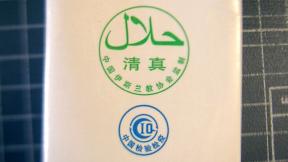
I loved the chicken sandwiches at the Muslim restaurant next to my office outside Chicago. The meat was juicy, tender, and spiced just right. More importantly, it was guaranteed as Halal to my co-workers and I by the establishment's staff. I used to buy it regularly until I discovered their meat wasn't really "Halal". Or I should say Zabiha.
What I consider Islamically edible food, I've learned, is not always the same to others and vice-versa. While varying definitions of what is really Halal, particularly meat, have split the Muslim community for decades in North America, the lack of a consensus are now costing Muslims in Illinois much needed consumer protection.
Former Illinois Governor George Ryan signed the Illinois Halal Food Bill into law in August 2001, making the state the third one to pass Halal food legislation at the time, the others being New Jersey and Minnesota.
Halal food legislation requires producers, merchants, and sellers of Halal products to provide proof that their products are Halal. Consumers are entitled to view this evidence to see if the Halal claim is legitimate or not. If not, the vendor is subject to penalties of the law. Violating the Halal Food Act in Illinois is a Class B misdemeanor.
The Act was supposed to be effective January 1, 2002. But because the Muslim community in Illinois, particularly Islamic scholars, have still not reached a consensus of what standard of Halal should be maintained, the legislation is still not being enforced.Some of the views on what is Halal and what is not
"There is such a broad spectrum and some people want to claim one extreme and others want to go to other extreme and all shades in between," explains Mazhar Hussaini about the understanding of what constitutes Halal to Muslims. Hussaini is CEO of the North American Halal Foundation and author of the book Islamic Dietary Concepts and Practices.
One "extreme" view, he says, accepts all meat slaughtered by the People of Book, Christians and Jews, as Halal. The danger here, Hussaini says, is that this may result in Muslims accepting almost every kind of meat as Halal.
The other "extreme" requires all Halal meat to be slaughtered by a Muslim slaughterman in a traditional manner. That means handslaguthered, severing four passages in the neck resulting in the death of the animal , without stunning, and only choosing animals and poultry raised without hormones, antibiotics and animals or animal byproducts as their feed.
The "in between views" include those who accept eating meat that has been mechanically slaughtered with a tape recording of the words "Bismillah Allahu Akbar" (In the Name of God, God is the Greatest) at the time of slaughter. These words must be recited over an animal at the time of slaughter for it to be considered Islamically slaughtered.
In Hussaini's view, the way to resolve the problem of definition is simple: go back to the exact way that the Prophet Muhammad, peace and blessings be upon him, used to make animals fit for Muslim consumption. That, he explains, is the strictest understanding of Halal, described above. This would mean:
- animals chosen must be free of hormones and have been raised strictly on vegetarian feed, with no trace of animal products or by-products in their diet;
- they must not have any antibiotics in their system at the time of slaughter;
- they must be slaughtered without stunning;
- the slaughter should be done in person by a Muslim slaughterman by hand, not machine; -the slaughterman must recite the Islamic blessing (Bismillah, Allahu Akbar) over the meat;
- the animals must be slaughtered from the front of the neck, cutting all four passages: the throat, the windpipe, and the two jugular veins in the neck;
- the death of the animals should occur by thorough bleeding, without cutting the spinal cord.
Currently, Hussaini says, about 30 percent of the Muslim community in Illinois, which includes about 450,000 Muslims in Chicago alone, accepts this definition of Halal. But if it is chosen as the standard the Halal Food Bill must enforce, it will be acceptable to Muslims even if they do not hold as strict an understanding of Halal.
It is up to the Muslim community in Illinois at this point to urge their scholars and Imams to reach a consensus on the definition of Halal so that Muslim consumers can confidently consume food labeled Halal, without confusion, miscommunication or deception.
"Halal conference of Kuwait" by Halal Industry and its Services Conference of Kuwait - Halal Industry and its Services Conference of Kuwait. Licensed under Creative Commons Zero, Public Domain Dedication via Wikimedia Commons - http://commons.wikimedia.org/wiki/File:Halal_conference_of_Kuwait.jpg#mediaviewer/File:Halal_conference_of_Kuwait.jpg








Comments
It's about time we recognize a Halal council and give them the authority to overlook the whole halal business. Really, it's pretty sad that we claim we are buying halal ( zabiha) meat but there's no guarantee of it, except for someone's word.
Location
Pages
Add new comment